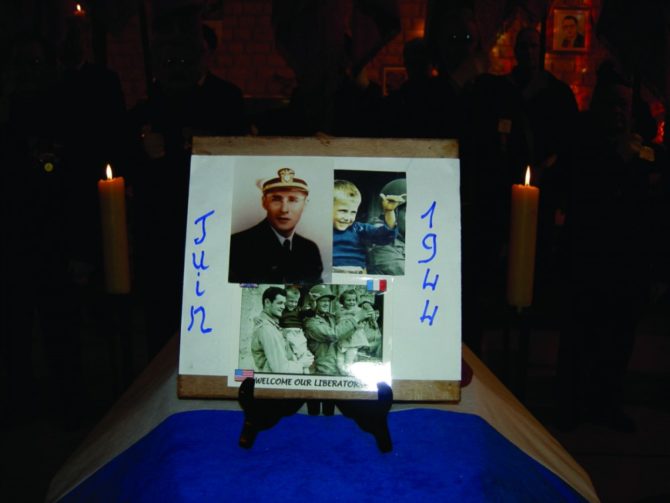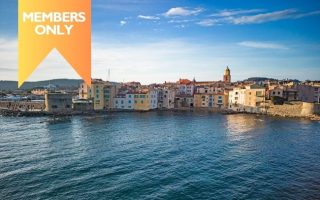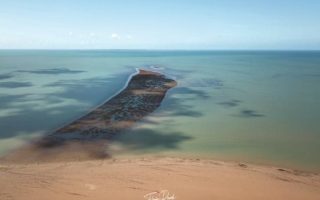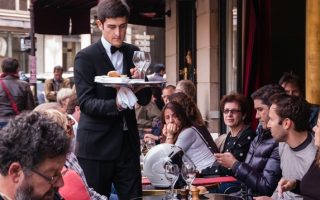Touching the Heart of D-Day

Dad was an officer in the Sea Bees, the Civil Engineer Corps of the United States Navy, and I grew up hearing stories about his time in France during the Normandy Invasion. The Sea Bees’ motto was: “we build, we fight” and their mascot, an exuberant looking bee, carried a drill and a gun. My Father spent over four months on the Normandy coast, first building the Navy camp on the cliff above Omaha Beach, then rebuilding bridges and carrying out a number of other reconstruction projects in the surrounding areas.
He liked to tell stories about his interactions with the French people during his time in Normandy. He’d studied French in a country high school in South Dakota, where the teacher had never even heard French and stayed one chapter ahead of her students. So Dad’s accent made ‘s’il vous plaît’ sound like ‘silver plate’.
Dad would hold up his sugar packet to a friendly Frenchman and ask, ‘Soocray n’est pas?’ The Frenchman, at first bewildered, would then nod and beam, ‘Ah oui, sucre’. Then Dad would point to his butter and say ‘booray’, again meeting incomprehension, then a relieved ‘Ah oui, le buerre’. Dad’s French improved a great deal from these encounters.
He told stories about France at dinnertime and would say, “Eat your vegetables. During the war, the French people didn’t have enough to eat.” Dad grew up on a farm and hated to see good food go to waste, and said that there was lots of that at the Sea Bees’ camp. So when it was his turn to oversee the mess tents, he’d load up pans of steaming meat, potatoes, vegetables, bread and pie, and head down the narrow lanes to a nearby farmhouse. He’d knock, point to the food, gesture and say ‘pour vous’.
The excited recipients would respond in a torrent of French, which Dad couldn’t understand. But he understood their gratitude. The next night, Dad repeated the same ritual, at a different farmhouse.
These stories were as much a part of my childhood as the yellow Formica table in our small yellow kitchen which we would crowd around to eat dinner. I never minded hearing the same stories over and over.
The one I loved the most was when Dad talked about the seven-year-old orphan, Gilbert Des Clos, who lived with a caretaker just above the Sea Bees’ camp. Dad had noticed the shy, skinny little boy hanging around the gate to the camp and thought that he looked like he could use a good meal. So using his best French, Dad invited Gilbert to go through the food line with him at lunch one day.
The shared lunch became a daily ritual and soon Gilbert began to follow Dad around as he carried out his duties, unloading the huge Navy ships or overseeing the camp’s construction and maintenance. Then, when the long, warm days of the summer turned into the short, crisp days of autumn, Dad’s orders changed. After more than four months in Normandy, his battalion was being sent home for a short leave and then on to the Pacific.
By this time, my Dad and Gilbert had become so close that he looked into adopting him to bring him home to America. But the French authorities said no. Dad and Gilbert had to say goodbye. I adored my Dad, so when I’d hear this story, I’d wonder what happened to the little French boy who had also loved him.
In 1991, just before my Dad died, he spoke again about his time in France in the war and the orphan Gilbert Des Clos. Dad always said Gilbert’s name with the soft ‘g’ sound, the way the French said it, ‘Geelbear’, and his voice took on a gentle tone. His words brought back memories of the familiar stories from my childhood, and made me realise how powerful Dad’s time in France had been for him. I noted too, that he had never forgotten Gilbert.
Maybe because of my Dad’s tales about France, I fell in love with the French language, studied it in high school and at university, and through the years, I worked to keep it up using books, tapes and classes.
In 1993, two years after my Dad’s death, I travelled to Normandy to tour the ‘invasion beaches’ and learn all I could about D-Day. I was writing a story in my Dad’s honour, describing my experience of the invasion through his stories. That article, which appeared in newspapers on June 6 1994, the 50th anniversary of D-Day, also mentioned the orphan Gilbert Des Clos.
In June 1994, my 19-year-old daughter and I began a month-long tour of France, including visiting Normandy for the ongoing D-Day 50th anniversary celebrations. In a moving ceremony at the Mairie in Caen, I received a medal in my Dad’s honour. The Mayor, with tears in his eyes, delivered a short speech in front of each of us, first in French, then in stilted English, as he pinned on our medals.
While in Caen, I placed a ‘petite annonce’ in the local newspaper, Ouest France, to look for Gilbert Des Clos. I had thought that it would be impossible to find the man after 50 years, but the presse attaché from the French consulate in San Francisco, who had read my article, encouraged me to try. “The French don’t move around like ‘les Américains,” she reasoned. “Chances are, he’ll still be right there in Normandy.”
She was so right. The next morning, Gilbert Des Clos read my ‘petite annonce’ and wept. He’d been waiting 50 years for some word from my Dad. Because I had thought it might take months or even years to find him, if I found him at all, I had put my home address in the ad. So Gilbert wrote to my address in California.
My sister was picking up my mail and saw the large envelope from France and the name Gilbert Des Clos. Knowing how important it was, she faxed the letter back to France, to a number I had given her on our itinerary. Two days before my daughter and I were to fly back to California, we had a tearful reunion with Gilbert and his family. All of those years I spent studying French paid off – Gilbert and his family spoke no English. When we parted, I vowed that we would never lose touch again.
For two years, we stayed connected through regular letters and phone calls. Then I returned to France with other family members for a grand fête in the town hall of Gilbert’s village. The Mayor attended and the local paper ran an article, with photos, about our joyous day. The next year, Gilbert and his family spent two weeks in California, where some 40 members of our family celebrated the miracle of our reunion with dinners and picnics, including an intergenerational, cross-cultural soccer game.
I felt wonder and awe that somehow my Dad’s stories from my childhood had caught up with my real life. And Gilbert did become my French brother, just 50 years later than originally planned. As the years passed, I visited Gilbert and his wife Huguette often and kept in touch with frequent calls and letters.
For the 60th anniversary of D-Day in 2004, I travelled to France with Stephen Ambrose Historical Tours, as a guide and translator for a group of United States Army Rangers and their families. I had the touching job of translating between the grateful French and the ‘vieux soldats’, the elderly soldiers who had journeyed back to Normandy. I also spent time with Gilbert and his family.
I had planned an extended visit with Gilbert for early 2008 and we all looked forward to it. Sadly, in November 2007, Gilbert was diagnosed with liver cancer. I so hoped that I could get there in time but he died just hours before I was due to arrive. By travelling non-stop, I was able to attend his funeral.
Friends and family filled the church in Gilbert’s village on that cold February morning. I sat in the front pew with his family, and as part of the service, placed a frame with a photo of my Dad and one of Gilbert from 1944 onto the casket. They were both gone now. That chapter of the story had ended. But as I watched the candle light flickering across the pictures of the young American lieutenant and the little French boy, I was struck by how my Dad’s kindness – reaching out his hand to a hungry youngster – still reverberated 64 years later.
My Dad had wanted Gilbert to become a part of our American family. If he had come to America, the story and our tie to France would have ended. Instead, I sat as part of Gilbert’s French family, in an ongoing story of love and connection.
Diane Covington-Carter’s award-winning writing and photography has appeared in Reader’s Digest and More magazines, among other publications, and on National Public Radio. Her memoir, Reunion, Finding Gilbert, will be available mid-2014.
Originally published in the February-March 2014 issue of France Today
Share to: Facebook Twitter LinkedIn Email
Leave a reply
Your email address will not be published. Required fields are marked *




REPLY